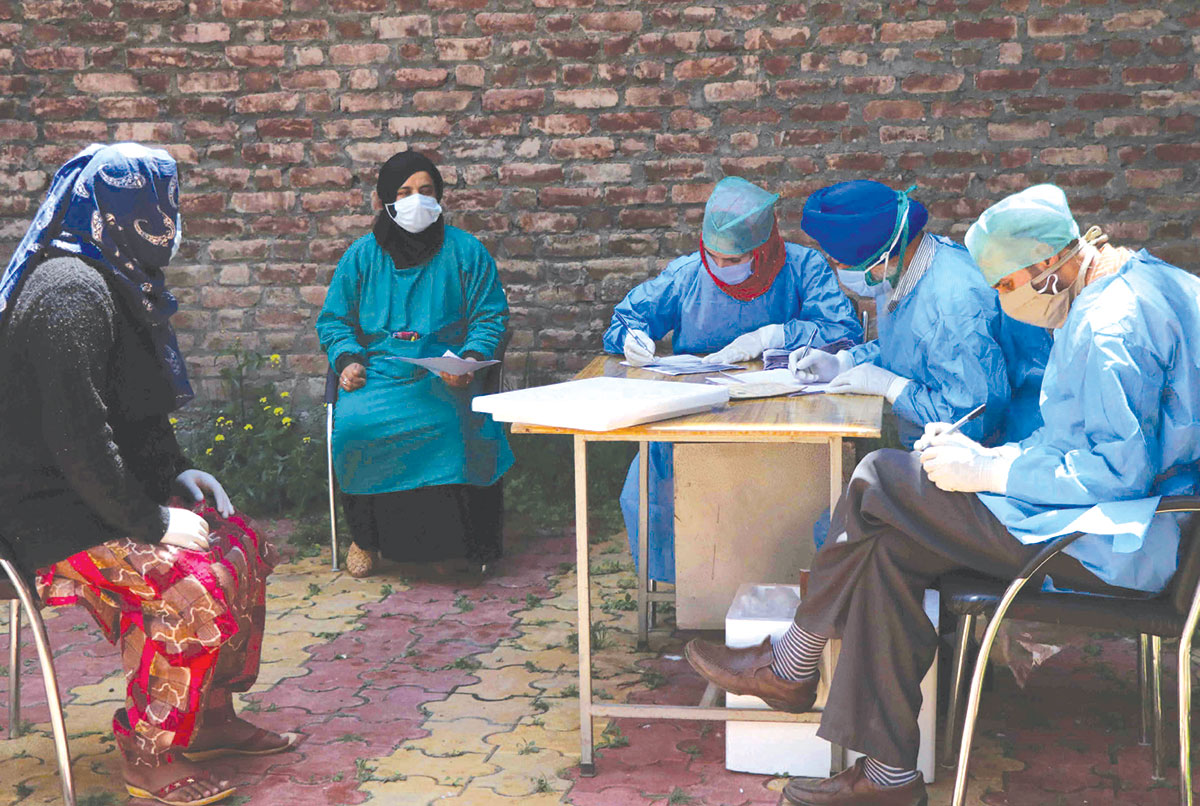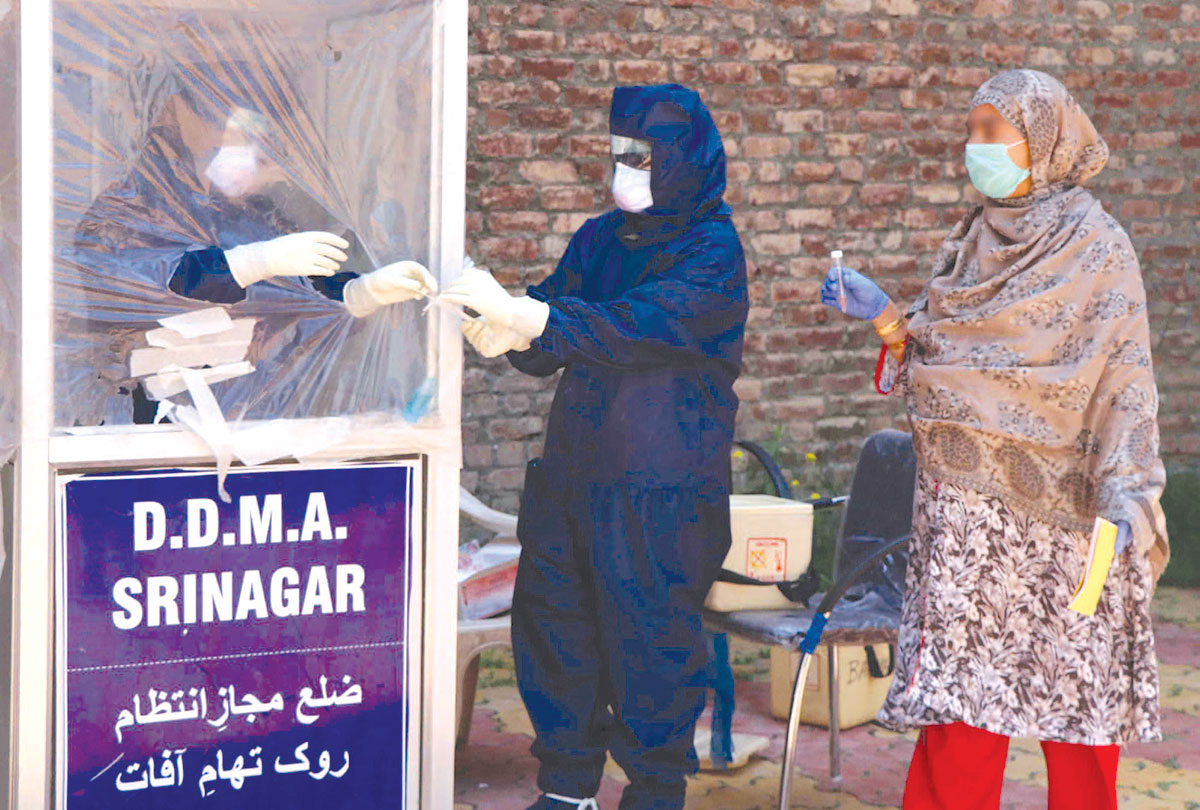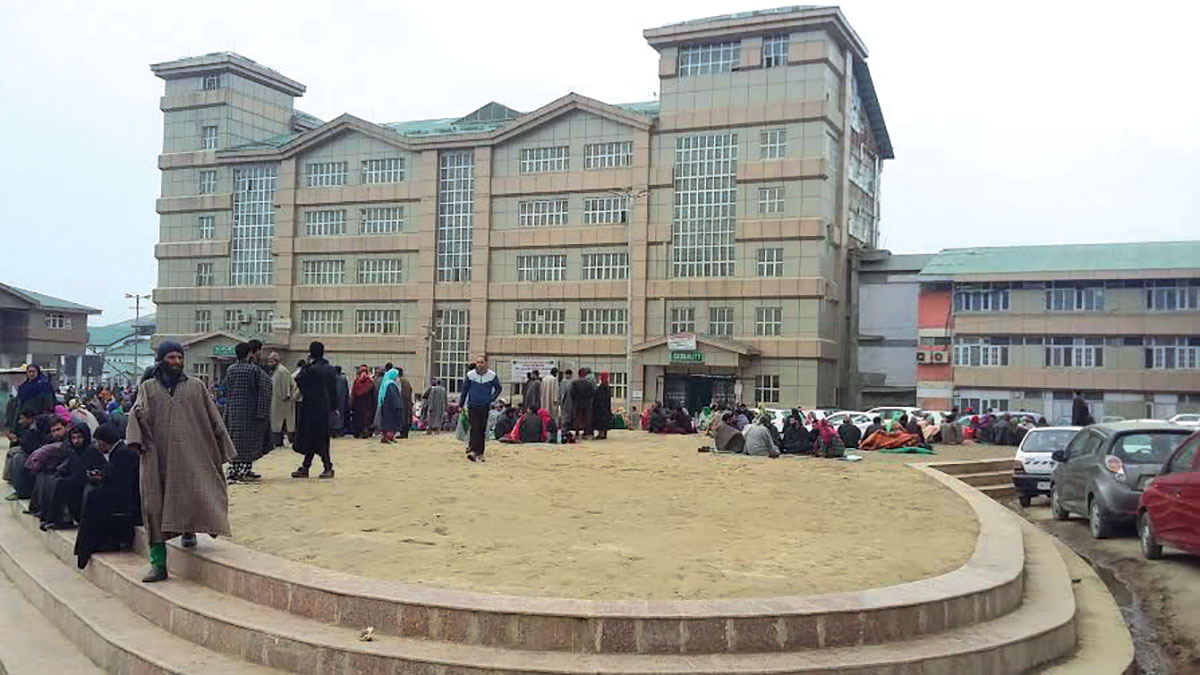At a time when Kashmir’s Coronavirus caseload is soaring past 5000, the exponential rise in the number of infected pregnant women has raised fears of community transmission. Saima Bhat met some of these women to record their lonely struggle against the disease while fighting an elusive virus

Eleven years after her last child, Shokey Jan, 35, was pregnant again. When she first revealed this to her family in August 2019, their joy knew no bounds. Barring her visits to the local health centre or doctor’s clinic, her journey of nine months passed away in her home in isolation.
In April 2020, an unexpected phone call changed everything. The caller on the other side, a local Aasha worker (midwife), made the expecting mother speechless. For a moment she did not know how to react. When she gathered herself, all she could say was “are you sure it is me?”She had been declared Covid-19 positive.
A resident of Shangus, Nowgam in Anantnag, Jan, a mother of two, had not come into contact with anybody over the nine months of her pregnancy.
Jan’s swabs had been taken a few days earlier. The Aasha worker had visited the family a week earlier to inform her about mandatory Covid-19 testing for all expecting mothers. Having already completed her 36th week, her name was on the priority list.
Following day, Jan and one more expecting woman in the neighbourhood was taken to a local hospital for their swabs.
After a few days, the family was happy to learn that both Jan and the other woman had tested negative.
“The news was normal to me because I was sure that I’ll test negative. For these nine months, I was confined to my home only and we had no history of travel as well,” Jan said. “I was all well and did not take any medicines during pregnancy. I have had normal deliveries in my previous pregnancies.”
Following day Aasha worker informed her that she was positive. Before she could come to terms with the new reality, an ambulance stopped outside their house and she was whisked away.
“My husband and my neighbours had a long discussion with the health officials saying that there must be some problem with the results. But they didn’t agree,” Jan said. “Finally they said no hospital will admit me in case of any emergency which compelled me to go along with them.”
Her next destination was Trauma Hospital at Bijbehara, a Covid-19 facility centre. After a stay of about an hour and she was referred to Srinagar for further treatment. “Doctors asked me about my expected date of delivery. I told them I have only 4 to 5 days. They refused to keep me there.”

In Srinagar, she was taken to JLNM hospital at Rainawari. “Driver asked me to stay in the vehicle till he spoke with the hospital administration,” Jan said.
Once the driver was back, the destination changed. Now it was Sher-i-Kashmir Institute of Medical Sciences (SKIMS) at Bemina.
At SKIMS, Jan was admitted in a room with three or four beds kept in a row. For the following three days she was the only patient admitted in the room. Doctors visited her as per the routine but she said she was normal. After four days of her stay, she started developing labour pains. The doctors on duty helped her deliver the baby normally. “It was a baby boy. I felt great. But at the same time, I had left all my desires of being home, with my family. It seemed like it was my end at an unknown place,” Jan said, adding, “I had a baby after 11 years and no one from the family could accompany me. I was all alone.”
After delivery, she was shifted to another room. To the right and left of her room were two couples. One was from Tral. They had been in the hospital since 20 days and were waiting for their second test reports. She sought help from them to do the mandatory rituals for a new-born.
“I requested one of them if he could recite Azaan in the ears of my kid. He was generous enough, he agreed,” Jan said.
Four days later, she was shifted to Akura, Mattan health centre where she was kept for 17 more days. Two days before Eid, she was allowed to go home.
“I was in the hospital for 25 days. But believe me, I will never forget this time,” Jan said. “I had clicked many pictures in the hospital but after reaching home I deleted all of them. I didn’t want to keep any memory of those days.”
Jan is still sceptical about why and how her tests turned positive.
An increasing number of infections in pregnant women in Kashmir has come as a surprise. Without travel history or any contact, the surge has led to fears of a “community transmission” in Kashmir.
But the officials say the increasing number surfaced due to massive testing after a local court took a suo motu cognisance of the death of two pregnant women in Anantnag district.
Following the court’s intervention, the Divisional Commissioner, Kashmir, PK Pole, directed the health authorities “to devise a birth plan for the pregnant women so that they could be screened for Covid-19 well in time.” Thereafter, it was made mandatory for pregnant women to be tested at least a week ahead of their delivery.
From April 25 till June 14, around 351 women tested positive for the novel Coronavirus. Out of these 74 were tested positive on a single day on June 7.
As per the official figures, 76 positive cases of pregnant women are from Anantnag district and 73 are from Kulgam. Both districts also top the list of the Covid-19 positive cases in Jammu and Kashmir with 489 and 631 cases respectively till June 14.
These two districts are followed by Baramulla with 71 positive cases of pregnant women, Shopian with 34 cases, Kupwara with 32 cases, Bandipora with 23 cases, Ganderbal with 15 cases, Srinagar with 13 cases, Pulwama with 12 cases and Budgam with 6 cases.
A total of around 10,000 pregnant women were tested for the virus in all the ten districts of Kashmir.
The sharp spike in the number of Covid-19 positive pregnant women, however, has not taken the health authorities by surprise. “As the testing for pregnant women was made mandatory, it is normal that many came positive,” said Dr Qazi Haroon, Official on Special Duty at the Directorate of Health Services, Kashmir. He refutes all claims of community transmission.

After the surge in numbers of these pregnant women positives, the Jammu and Kashmir administration decided to set up separate hospitals of 30 to 50 beds in all the ten districts of the Valley.
The repeated visits of pregnant women to hospitals for ante-natal checkups and deliveries have made them susceptible to contract the virus, say experts.
Last week a video went viral on social media. It showed a family alleging that the doctors didn’t attend to their patient, a pregnant woman, at the District Trauma Hospital Bijbehara.
Firdousa, a resident of Hogam village in Anantnag district was declared Covid-19 patient and admitted to the hospital, where she was kept in a room on the first floor along with seven other pregnant women, also Covid-19 positive. On June 3, she went in labour and one of the patients went downstairs to call the doctor but she found none, claims the family.
Unable to bear the pain, Firdousa went downstairs herself to call the doctor but when she reached the corridor her labour pain did not allow her to move further. She laid down. Moments later, she delivered a baby.
“All the women patients were in tears. The women circled me, crying, perhaps thinking my end was near. After a few minutes of struggle, I delivered the child in the corridor,” Firdousa was quoted saying in a media report.“The child remained hanging by the umbilical cord for more than an hour as no doctor turned up, despite repeated calls for help.”
As per the video that was put on social media, it was only after a protest by Firdousa’s relatives that a few doctors came to see her and cut the cord of the newborn baby. But by then, her condition had deteriorated as the placenta was still inside her body. Her immediate family including her husband were in administrative quarantine. She was referred to SKIMS, Bemina, where doctors said she was received in critical condition.
“This is not the first such case we received from Bijbehara but there are a number of such cases. Just two days ago we received a patient from the same hospital when she was in full labour. They are doing injustice with these patients. It is criminal,” said a registrar at SKIMS hospital who received at least three such patients from the same hospital in critical condition. She added: “We also have 100 Covid-19 patients but 90percent of them are asymptomatic. Such patients should be sent home so that the rush in hospitals can be minimised.”
Dr Showkat Hussain, medical superintendent of the hospital, has said that the hospital had been initially designated as a Covid-19 centre for only asymptomatic patients. “But now they are dumping all kinds of Covid-19 patients here,” said Hussain.
According to Dr Hussain, the hospital has just six doctors on the rolls, three of whom were sent to quarantine following their contact with a Covid-19 patient.
As the issue was flared up, the district administration came into action. The Deputy Commissioner Anantnag, KK Sidha, ordered an inquiry into the case. There are already two more enquiries going on in the district regarding the death of two pregnant ladies.

As this report was being filed, another probe was started and report submitted to the Directorate of Health Services, Kashmir from the Covid-19 centre in Bijbehara, where a pregnant lady from Shamsipora, Mattan was admitted and after completing her treatment was handed over with a Covid negative certificate. As the lady was shifted to a sub-district hospital in Bijbehara for her delivery on June 7, where her delivery was conducted in the routine theatre on June 9 and then put in a general ward, her another swab sample was taken, which turned to be positive. The report came two days after she was discharged from the hospital.
As of now, the whole hospital has to be sent in quarantine and she has also been put under isolation. It has come to fore that the medical certificate issued in her favour actually belonged to another patient who had recovered and defeated the viral infection.
But these stories are not restricted to one place. At the North Kashmir’s isolation centre in Kupwara district, it was a Covid positive person who helped a pregnant Covid-19 positive woman to deliver her baby.
“A Covid-19 patient helped me in my delivery. When other patients at the isolation centre Kupwara tried to contact health officials, they didn’t bother to visit the hospital. We were left at the mercy of God,” she said. “There are more pregnant women in the isolation centre in Kupwara. Doctors shy away from attending them.”
Back in South Kashmir’s Sarnal, Shebu is depressed. Any mention of her stay in the two different hospitals still gives her goosebumps. She is in the 38th week of her pregnancy.
It was May 26 when Shebu, 28, was asked to give her swab samples for Covid-19 testing. After four days she received a call from hospital administration that she has tested negative. “But after a few hours, I got another call from the same hospital informing me that the test is positive.”
Shebu said she was later taken to Bijbehara hospital and her family including her mother, brother, the husband and two-year-old daughter were taken to the administrative quarantine.
At Bijbehara hospital, Shebu said, it was chaos. When she reached the hospital, she was told to occupy any bed wherever she finds a space. She went inside a small room, where one more woman was present, also pregnant.
“I felt comfortable it was a woman than sharing the room with more patients. No food was provided there. One day a Covid positive patient had got biscuits from his home. He distributed them among all patients. That day I was on that single packet of biscuit,” she said.
After spending three days in the same room, Shebu, started bleeding one evening. When she went downstairs to call a doctor, she claims there was none.
“Following morning when gynaecologist was in the OPD, I went there and told her my problem. Even if she was in full PPE gear, she did not touch me. Instead, she said I should go back to my room and hospital administration will deliver medicines to me in the room,” she added. “Till evening nobody came to me nor were any medicines provided.”
Shebu’s family tested negative after four days. They were asked to stay in-home quarantine. Her aunt is a health worker and Shebu decided to call her. “She called the hospital administration and informed them about my case. She told them if anything happens to me they will be held responsible. It was only after that some woman in PPE, came to me and asked to give in writing that if anything happens to me I will be responsible.”
But Shebu, a sociology graduate refused to sign the bond. She alleges that she was asked if she can’t sign the bond then she has to be shifted to Srinagar. “She told me if my bleeding increased, they won’t touch me. I first asked them to inform my family so that one relative could accompany me. I was mentally disturbed but they refused. I gathered the courage and went inside an ambulance and started my journey to SKIMS Bemina,” Shebu said.
At SKIMS, Shebu said the doctors monitored her for seven days, after which she was tested again which turned out to be negative. She was then shifted back to Bijbehara hospital and then to Anantnag district hospital from where she was taken home and put under home quarantine.
At her mother’s home in Sarnal, Shebu spends her days in distress. She is still worried about her fate. “I have a few days left for my delivery but I am apprehensive if any hospital will admit me even if I have a Covid-19 negative certificate. There have been two deaths in the Anantnag hospital and it is giving me sleepless nights,” she said. “How is it possible that if I was positive, my whole family turned negative including my minor daughter who is always with me?”

Most of the pregnant women who were declared Covid-19 positive had their families turning negative. The doctors say it actually depends on the viral load. In district Bandipora, the trend was seen if one family member was positive then the whole family turned to be positive but in other places the trend was different. “It depends on how the virus actually behaves. Some strains are weak and some are strong, as in Bandipora,” said Dr Haroon.
A general impression in the medical research community is that the virus being newer, the actual behaviour is still not fully known. A belief is that pregnant women do not carry any special risk of infection in comparison to healthier adults. There are no clear studies available about newborn babies as well. However, what is important that pregnant women must have adequate monitoring mechanism. Globally, the expecting mothers are being advised to stay home, avoid gatherings, wear masks, hand wash frequently and avoid public transport. Most of the expecting mothers including Covid-19 cases are safer at home in comparison to the hospitals where nobody is monitoring them.
(Names of some of the patients who spoke for this report were changed to protect their identity.)















